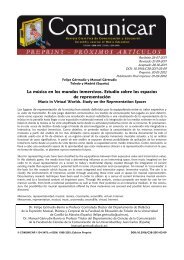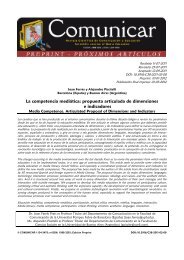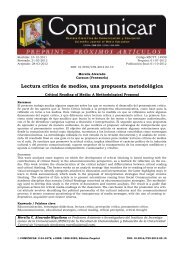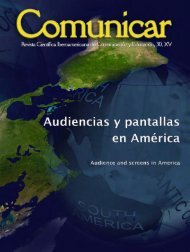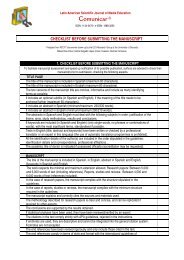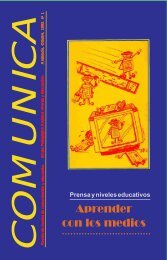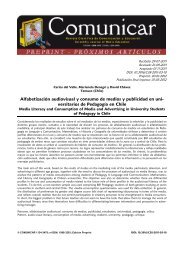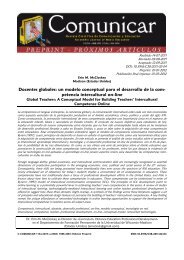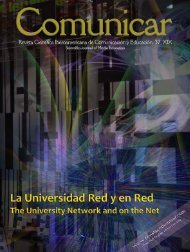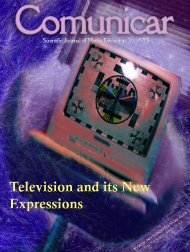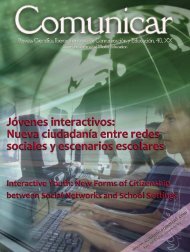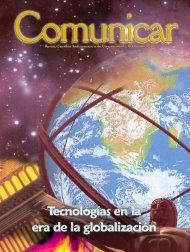Comunicar 39-ingles - Revista Comunicar
Comunicar 39-ingles - Revista Comunicar
Comunicar 39-ingles - Revista Comunicar
You also want an ePaper? Increase the reach of your titles
YUMPU automatically turns print PDFs into web optimized ePapers that Google loves.
93the clues for further reading they might provide. Last,but not least, reports of experiments carried out inclassrooms, in different curriculum subjects, in afterschooland training activities in contexts other thanschools, represent an inexhaustible supply of inspirationand attention, if only to indicate the paths or solutionsthat should be avoided. In this context, theInternet and, particularly, tools and interactive anddigital platforms as well social networks go beyondopening doors to a wide range of resources as they arethemselves essential resources.The outline of a non-reductive view of the resourcesneeded for media literacywould, however, be incompleteif we did draw attentionto a final element related to thevision of the role of media insociety and culture. In fact, thiselement underlines a largerissue in media education development.As pointed out in1989 by the influential Cana -dian work «Media Lite racyResource Guide», the resourceshave little meaning if theydo not take into account theunderlying rationale. Thisincludes the recognition thatthe media construct social reality,but at the same time, theyare themselves a reality socially constructed. Mediaoutput contains ideologies and worldviews that aremore often invisible to the naked eye; what they explicitlyor implicitly convey influences social and politicallife. This does not mean that those who receive themessages they send necessarily do so in a passive way.This already occurred in the era of mainstream media,and it happens now but on a larger scale in the age ofinteractive and digital media.2. From research to the field: creating resourcesfor media literacy2.1. Starting points: the evidence from researchOn 16 December 2008, a resolution on «MediaLiteracy in a Digital World» passed by the EuropeanParliament pointed out that «acquiring media literacybegins in the home with learning how to select fromthe media services available», stressing «the importanceof media education for parents, who play a decisiverole in the development of children’s media-usehabits». This recommendation, and the research alongthese lines, has highlighted the importance of thefamily context for media reception. Several researchershave stressed the value of the family in mediatingchildren’s relationship with the media (Strasburger &al., 2009; Lemish, 2008; Pinto, 2005; Pereira, 1999).In fact, one of the main discoveries of research onaudiences is the increasing recognition of the importanceof reception analysis and consumer context: thefamily environment. The amount of time that youngpeople devote to media frequently gives rise to concernamong parents who do not always possess thenecessary tools to analyse and understand this realityand act upon it. Several studies developed in differentOne of the main discoveries of research on audiences is theincreasing recognition of the importance of receptionanalysis and consumer context: the family environment. Theamount of time that young people devote to mediafrequently gives rise to concern among parents who donot always possess the necessary tools to analyse andunderstand this reality and act upon it.countries show the significance of direct interactionbetween children and adults. If parents discuss, commenton and help children interpret media content,they can help their children understand their messages.Media play a significant role in children’s socializationprocess; the media are a unique source of learningand contact with the world. Several authors (Stras -burger & al., 2009; Pereira, 1999; St. Peters & al.,1991) defend the idea that parents can influence theway children use the media and the learning processthat develops from these experiences.As a result, parents should be sensitized to thisimportant task and have access to resources thatinform them on how to deal with children’s mediaexperiences. In Portugal, the lack of materials and guidelineshas conditioned the implementation of mediaeducation in contexts such as school or family. Thisled us to design a project, having taken the results fromresearch as a starting point, the various experiencesfrom training and considering the gap between theoryand practice identified by research and training, whosemain aim was to produce materials to support media<strong>Comunicar</strong>, <strong>39</strong>, XX, 2012© ISSN: 1134-3478 • e-ISSN: 1988-3293• Pages 91-99



